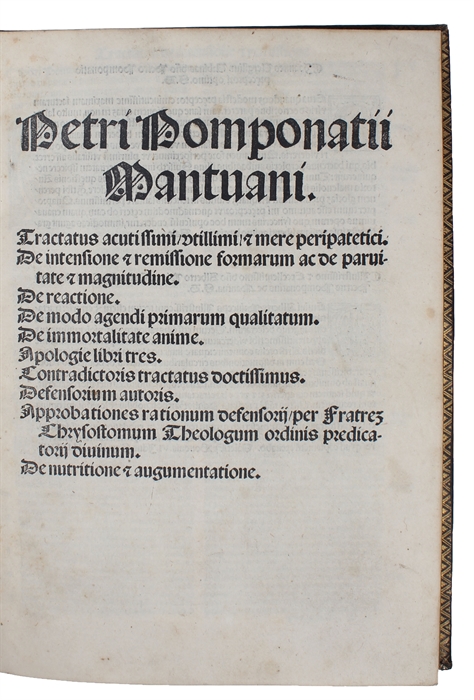THE FREEDOM FROM DOCTRINAL ORTHODOXY
POMPONAZZI, PIETRO [PETRUS POMPONATIUS].
[Opera]. Tractatus acutissimi/utillimi/ & mere peripatetici.De intensione & remissione formarum ac de paruitate & magnitudine. De reactione.De modo agendi primarum qualitatum.De immortalitate anime.Apologie libri tres.Contradictoris tractatus doctissimus.Defensorium autoris. Approbabtiones rationum defensirij/ per Fratres Chrysostomum Theologum ordinis predicatorij divinum.De nutritione & augumentatione.
Venice, Octavianus Scotus, 1525.
Small folio. Bound in a lovely 18th century full green morocco binding with richly gilt spine, triple gilt line-borders to boards, double gilt lines to edges of boards, and inner gilt dentelles. All edges gilt. A few leaves a little closely shaven. Title-page and final blank slightly dusty/browned and last few leaves with a faint small, marginal damp stain, far from affecting text - otherwise a remarkably fine, clean, and fesh copy with only very minor occasional brownspotting. A beautiful printing with beautiful woodcut initials to almost all leaves. Large woodcut printer's device to colophon. A truly lovely copy, housed in a custom-made full leather box with gilt title to spine. 139 ff.
The exceedingly scarce first edition of Pomponazzi's collected works, a milestone publication of Renaissance philosophy, which constitutes the authorized "opera" of Pomponazzi and brings together for the first time the known body of writing of arguably THE most important philosopher of the Renaissance, disseminating them to a wider audience.
This seminal publication, printed in the year of Pomponazzi's death, remains to this day the standard edition of and the main source of reference to the works of "The last Scholastic and the first man of the Enlightenment" (Sandy, Randall, Kristeller). It greatly influenced the dissemination of his works and thought and came to directly influence philosophical and scientific thought of centuries to come.
"Pomponazzi's thought and reputation were extremely influential in the centuries after his death. Even before it was printed, his treatise "On incantations" circulated widely in manuscript among philosophers, physicians and early modern naturalists (see Zanier 1975). Due to his mortalist theory of the soul, 17th-century "free thinkers" regarded Pomponazzi as one of their own, portraying him as an atheist (see Kristeller 1968; Paganini 1985). Enlightenment thinkers of the 18th century pushed to extremes his distinction between natural reason and faith, while 19th-century positivists, such as Ernest Renan and Roberto Ardigò, saw in Pomponazzi a forerunner of their own beliefs and a champion of naturalism and empiricism." (SEP).
Pietro Pomponazzi (1462-1525) was an author of both commentaries and original philosophical treatises and also as such a key figure in the Aristotelian tradition of the Renaissance. Pomponazzi stood at a crossroad in the history of Aristotelianism - he still studied the great logicians and natural philosophers of the 14th century, which his Italian humanistic colleagues had given up (focusing instead on "man" and his place in the universe), but at the same time he had a highly original approach to the teachings of Aristotle and a unique uninhibited approach to the nature of the universe; as opposed to his contemporaries, he responded philosophically to the achievements of humanism, always seeking the truth and the "naturalist" explanation.
With his wide-ranging works, published together here for the first time, Pomponazzi was a fore-runner of that difficult to define critical Aristotelianism, which sought to find the true meaning of the works of Aristotle, lay them bare and develop them further, in order to find the true nature of the universe - to explain how the world functions without any preconceived notions (like the belief in Christ, etc.). "This freedom from doctrinal orthodoxy - quite rare among Renaissance Aristotelians - was one of Pomponazzi's real contributions to the progress of scientific thought. By refusing to be bound by specific position, by constant testing and doubting. Pomponazzi brought the firm conclusions of the scholastic Aristotle to a dead end. And in doing so, he opened up a whole new philosophy of nature." (Pine, p. 19).
As such, Pomponazzi occupies a truly unique position in the history of Renaissance philosophy. "Pomponazzi's thought, by combining Averroism and Alexandrism, could not be squeezed into one category or the other. Indeed all such divisions were too simple when applied to him." (Pine, p. 5).
With his magnificent undoctrinal works of pure thought and reason, Pomponazzi inaugurated a tradition that was to become dominating in following centuries, founding an entirely new philosophy of nature and paving the way for the acceptance of a later mathematical view of nature.
"During the twelve decades or so between Pomponazzi's arrival (1484) and Galileo's departure in 1610, the learned community that Shakespeare called "fair Padua, nursery of arts", achieved a distinction in scientific and medical studies unmatched elsewhere in Europe. Thus, Pomponazzi's career in northern Italy brought him close to the most exciting advances of his time in science and medicine. In keeping with the nature of his university appointments, he approached Aristotle from a perspective quite distant from Bruni's humanism or Lefèvre's theologizing. [...] Pomponazzi's Aristotelianism developed entirely within the framework of natural philosophy". (Copenhaver & Schmitt, p. 105).
Order-nr.: 53741


![[Opera]. Tractatus acutissimi/utillimi/ & mere peripatetici.De intensione & remissione formarum ac de paruitate & magnitudine. De reactione.De modo agendi primarum qualitatum.De immortalitate anime.Apologie libri tres.Contradictoris tractatus doctissi...](/images/product/53741b.jpg)
![[Opera]. Tractatus acutissimi/utillimi/ & mere peripatetici.De intensione & remissione formarum ac de paruitate & magnitudine. De reactione.De modo agendi primarum qualitatum.De immortalitate anime.Apologie libri tres.Contradictoris tractatus doctissi...](/images/product/53741c.jpg)